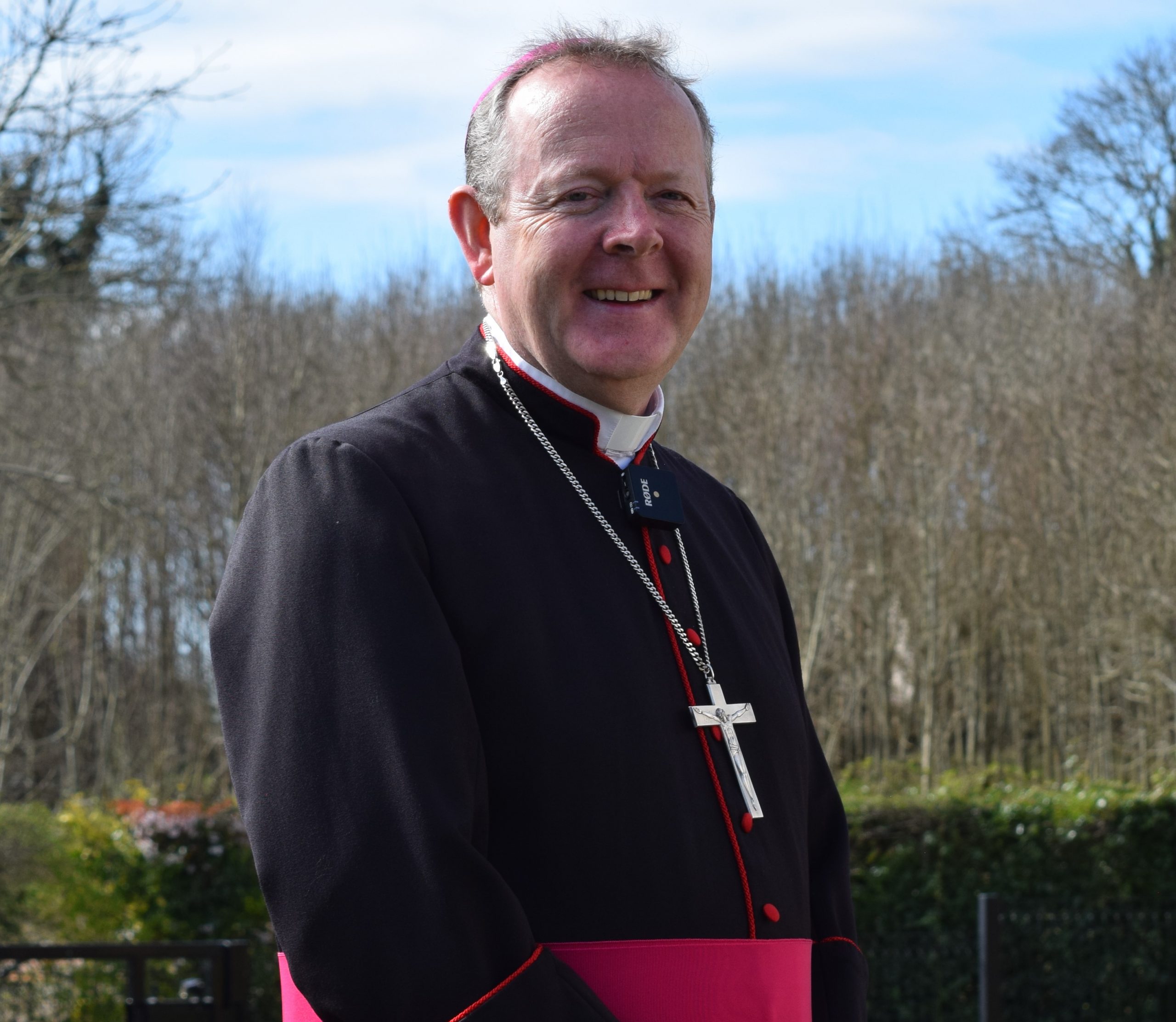Archbishop Eamon Martin, Homily, 23 October 2022, World Mission Sunday.

‘Hospitality’ and ‘accompaniment’ are as important today as ever
“For generations the people of Ireland were almost entirely dependent and were very grateful for the provision of health services by Catholic religious congregations like the Saint John of God brothers.”
How does one say thanks to the Saint John of God brothers for their ministry here at St Mary’s Drumcar over 76 years?
How can we appropriately acknowledge on behalf of countless residents and other service users, their family members – and, of course, on behalf of the people of Ireland – the care and compassion shown here at Drumcar, and in its community outreach services, to people whose very special needs were often overlooked, misdiagnosed or misunderstood by wider society?
How do we say thank you?
We have chosen to do so today in a Mass of thanksgiving, for there is no better way to give thanks than to celebrate the Eucharist. In this unique and powerful way we return gratitude and praise to almighty God who has given us such amazing gifts and graces, and who loved us so much that He gave His only Son to be our Saviour by giving His life for us on the Cross.
I am struck by the image of Saint John of God on the front cover of the booklet for today’s Mass of thanksgiving – a poor man, barefoot, simply dressed, but still, a man on a mission, with a staff in his hand, as if for a journey. The basket over his arm symbolises for me someone who is ready to give to others, but perhaps also someone who is ready to receive. “Do good for yourselves by doing good for others”.
It was relatively late in life, in his early 40’s, when John gave himself over to the service of God, and began to devote himself entirely to caring for the poor and the sick – indeed it was his own very negative personal experience of harsh and degrading treatment at the Granada Mental Hospital, 500 years ago in Spain, that led John to realise that those who struggle in this way need care, love, compassion – not judgement, cruelty and chastisement. Instinctively, others were drawn to assist John in his works of mercy, including to those who were marginalised and rejected by society due to their mental health.
He became known as John ‘of God’ – wouldn’t it be wonderful if people began to call any one of us by the nickname, ‘of God’ – ‘Ronan of God’; ‘Paula of God’?!
It strikes me also today that, in our Irish language, a person with special intellectual needs, or profound mental health issues, was known as ‘duine le Dia’ – a child of God, a person with God!
The mission of the Saint John of God brothers here simply couldn’t have happened without a whole network of people, a whole community of people surrounding the brothers, supporting them in this work of God. Again, the illustration on the cover of today’s booklet shows, in the bottom edging, a whole family of people – young and old, children and elderly, able bodied and dependents – all connected to the merciful work of the Saint John of God brothers – countless companions on their journey, and in their mission.
Today is Mission Sunday. What an appropriate day on which to reflect on the story of Saint Mary’s Drumcar! The work of all Saint John of God communities has, at its core, the imitation of Christ, who Himself reached out to the sick, the troubled, those with physical, mental, emotional and spiritual needs. And before His Ascension into heaven, Jesus commissioned His friends and followers to go out and do likewise. ‘You shall be my witnesses’, He told them. Jesus sent them out, as a community of disciples, especially to look out for the poor and the sick, and to be inspired by the Holy Spirit to read and respond to the signs of the times.
The Saint John of God brothers came here to Drumcar in order to be witnesses to the loving, merciful and caring work of Jesus. They were inspired by the Holy Spirit to form a praying community of care made up of many ‘companions for the journey’ who have assisted them in their work. Now they are moving on. But the work of mercy does not end. The mission of our Lord Jesus continues until the end of time. It is just that it is finding new ways to respond to the signs of our times.
When the Saint John of God Brothers first came to Ireland from France, back in 1877, they immediately began to dedicate themselves to caring for the most abandoned and needy of God’s people. Just like the Good Samaritan along the road to Jericho, they drew near to those in Irish society who were neglected on the sidewalks of society, often locked up and hidden away in work-houses and county homes, because no one would, or could, care for them in the special way that was needed. Firstly in Tipperary and Stillorgan, and then in Blackrock and Mulhuddart, Stamullen and Celbridge, and here at Drumcar, the Saint John of God brothers formed communities to care, and established homes of hospitality where special needs and mental disabilities could be taken care of. On behalf of Irish society they worked hard to build expertise and understanding of how best to reach out to God’s special people with tenderness, compassion and with a merciful heart that cares for those who have moderate or even severe or profound special needs.
I thank God for leading Brother Killian Herbert and his companions here to Drumcar in 1946, to the former ancestral home of the McClintock family, where they found a whole neighbourhood and network ready to join with them in their mission of mercy. For me,two particular words come to mind when I think of their mission here at Drumcar – the words ‘hospitality’ and ‘accompaniment’. These qualities are as important today as they were back in 1946:
– Hospitality, to provide a home where people can be loved and given their dignity as individuals created and loved by God;
– Accompaniment – to journey with someone on their way, to be their companions so that they can nurture their confidence, self-belief and self-esteem, and grow and develop to be the person that God wants them to be.
Please God, ‘hospitality’ and ‘accompaniment’ will continue in the new ways of caring being offered today, and in the future. There have been huge developments in society’s understanding of how best to reach out to those with physical and intellectual disabilities – and we continue to learn from the challenges and failures of the past in this regard.
Down the decades the community here at Drumcar has been open to such learning and to embracing new thinking and best practices in providing outreach support, in developing skills and appropriate programmes and training and employment opportunities for those with special needs, so that they can be more fully integrated into family, community and society.
There is one special ingredient, however, which I hope will not be completely lost or forsaken as the Saint John of God brothers move on from here. For the brothers, and for the wider community of care which existed here at Saint Mary’s, everything that was done here was situated in an ethos of prayer, and was inspired by the love and compassion of Christ. An essential part of ministry every day took place here in this very chapel – the commending of everything to prayer and to the guidance of the Holy Spirit – we are grateful to the local clergy who over the years provided chaplaincy and sacramental services to the community including the Eucharist.
As our health services become increasingly secularised, it would be a shame if we were to lose the spiritual motivation and inspiration that can add so much value to healthcare. For generations the people of Ireland were almost entirely dependent and were very grateful for the provision of health services by Catholic religious congregations like the Saint John of God brothers. Catholic healthcare places, at the centre, the life and inherent dignity and respect for each individual human person, created by God and made in the likeness of God. It seeks to build around it a community of caring companions who are motivated by the desire to serve, not to be served, and by a longing to provide hospitality, accompaniment and hope, inspired by the Gospel of Christ, to all; it looks out especially for the poor, the vulnerable, for those who might not have the resources or means to access healthcare services or who may otherwise be excluded or rejected by society; it aims to bring healing to the whole person by modelling the tender, one to one, attention and compassion of Christ which springs from a heart full of love and mercy. These were, and remain, the hallmarks of Catholic healthcare that is inspired by the Gospel, which I hope will never be completely lost from this country, as the Catholic religious congregations move away from the frontline provision of healthcare services. I hope and pray that the lay-led Saint John of God Hospitaller Services will keep their ethos alive.
The particular chapter of mission brought to Drumcar by a community resident here of Saint John of God brothers has come to an end. However, the need for love, compassion, care and attention for the marginalised among us remains as important as ever. As we say thanks on this Mission Sunday for the mission and ministry of the Saint John of God brothers here in Drumcar, let us commit ourselves individually and collectively to be on the alert for the new needs, the new missions, the new opportunities for hospitality and accompaniment in the Ireland of today. As in the time of Christ, as in Ireland 145 years ago when the Saint John of God brothers first arrived, so also today, in modern Ireland, there are those being left on the side of the road. Perhaps the Holy Spirit is saying something to us in that Drumcar is now providing hospitality to more than one hundred Ukrainian refugees, some of whom are here with us today. You are very welcome!
Let us always keep our eyes open for the new ways in which Jesus may be saying to us today: ‘You shall be my witnesses’. Amen.
+ Archbishop Eamon Martin
Archbishop of Armagh and Primate of All Ireland.




You must be logged in to post a comment.